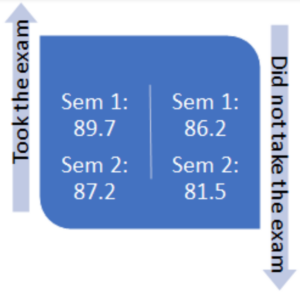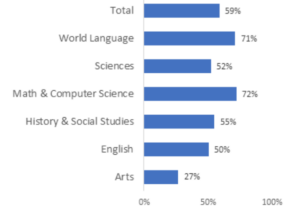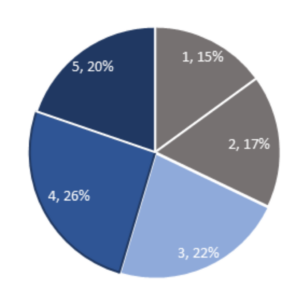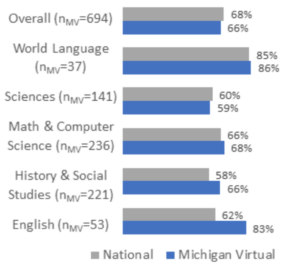Introduction
Advanced Placement (AP®) courses in high school allow students to take advanced courses with the possibility of earning college credit. The number of public school students taking AP courses in Michigan has increased over the past few years, with 56,885 public school students taking an AP course in 2023, an increase of 8.9% compared to 2022 (Ackley, 2023).
Michigan Virtual offers 22 two-semester AP online courses for high school students across Michigan who may, for example, not have the course available to them in a brick-and-mortar school or may prefer an online format. Michigan Virtual administrators recognize the importance of preparing students for the AP exam because the AP exam score, rather than the course grade, determines whether students earn college credit for their coursework. It further serves as an indicator to colleges about students’ mastery of the subject matter.
The first step in the AP exam process is for students to register for the AP subject exam. Then, they must complete the course, and pass the exam with a score of at least 3 out of 5. Similar to schools across the country, not all students enrolled in Michigan Virtual’s AP courses took the AP exam. Thus, Michigan Virtual sought to understand what factors predict whether students take the AP exams, and for those who do take the exam, whether students’ course grades predict students’ AP exam scores.
The information from this analysis was shared with Michigan Virtual administrators and their teachers as basis for a data-driven discussion about AP course grades, assignments, and supports for AP students (see below for details about the methodology). This brief describes the findings from this analysis and the questions that Michigan Virtual considered as they reflected on their data. This can be a model for the types of analyses that other education agencies, including both online programs and brick-and-mortar schools, can do better to understand their own AP courses and AP exam scores.
Methodology
This brief addresses the following questions based on data from Michigan Virtual’s AP courses and AP exams from 2023:
- What characteristics influence whether a student enrolled in an AP course takes the AP exam?
- For students who take the AP exam, do students’ course grades predict whether they pass the exam?
This analysis is based on 1,064 students who were enrolled in two consecutive semesters of Michigan Virtual’s online AP courses during the Fall 2022 semester and Spring 2023 semester and who did not drop the course during the grace period. These 1,064 students represented 1,182 enrollments because students could enroll in multiple AP courses. Sixty percent of students (or 58% of enrollments) took at least one exam (638 students representing 694 enrollments).
Data for this analysis included information about the student’s enrollment including course, timing of enrollment, type of school the student was enrolling from (e.g., local education agency, home school), quartiles of student diversity in their brick-and-mortar school, and course grade on a scale of 0 to 100. Although Michigan Virtual provides course grades to a student’s brick-and-mortar school, that school is responsible for determining the grade on the student’s transcript. Michigan Virtual data were merged with data provided by the College Board to Michigan Virtual including the AP exam title, score on the AP exam, and grade. Only de-identified data were shared for this analysis.
The first research question was addressed descriptively, to examine differences in the characteristics of enrollments that took and did not take the AP exam. The second research question was addressed using a regression model to determine how well course grades predicted AP exam scores, and to calculate the probability of passing the exam based on first semester course grade.
Who took an AP Exam?
Enrollments with higher course grades were more likely to take an AP exam (Figure 1). There were also differences in the percentages of enrollments taking an AP exam by course subject, with, for example, 70% of mathematics and computer science enrollments taking an AP exam compared to 27% in art and 50% in English (Figure 2). Other factors, such as late enrollment, the type and locale of the school the student attended, and the diversity quartile of the school, were not significantly different between students who took the exam and those who did not.
Figure 1. Course Grades for Enrollments: Who Did and Did Not Take an Exam

Figure 2. Percent of Enrollments Who Took an Exam

Questions for Future Consideration
- Students must sign up for an AP exam in the middle of their fall semester. Are students using their grades at the time of exam registration to decide about registering for the exam?
- For students who chose not to take an exam, what factors drove that decision? What are the barriers to AP exam registration? How could those barriers be addressed?
What was the distribution of AP exam scores for Michigan Virtual?
Sixty-eight percent of Michigan Virtual enrollments with an AP exam earned a passing score (at least a 3 out of 5; Figure 3). The overall pass rate for the state of Michigan was 65% (College Board, 2023a). However, the distribution of enrollments across AP exam subjects was different for Michigan than for Michigan Virtual. After adjusting for those differences, the percentage of Michigan Virtual students who passed the AP exams was similar to national rates and, in some instances, was higher (Figure 4).
Figure 3. Distribution of Michigan Virtual AP Scores

Figure 4. Percent of Enrollments that Passed the AP Exams by Subject

Questions for Future Consideration
- Why are passing rates higher in some subjects than in others?
- How do the characteristics of students at Michigan Virtual who take AP exams compare to those in Michigan overall?
How Well Did First-Semester AP Course Grades Predict Whether a Student Passed the Exam?
While first-semester course grades were associated with the likelihood that students passed the AP exam, the model could only predict 7 out of 10 enrollments accurately. For example, the probability that a student who earned a 95 in an AP course would pass the exam was 76%. The probability that a student who earned an 80 in the course would pass the exam was 52%. This quality of prediction suggests that factors beyond course grades may contribute to students’ achievement on the AP exams.
Questions for Future Consideration
- Are some students performing well on the AP exam, but not well in the course and vice versa?
- What do we know about students’ experiences in AP courses or other courses?
- What factors beyond course grades could predict students’ AP exam scores?
Conclusion
This analysis shed light on the AP exam performance of students taking AP courses at Michigan Virtual. Students who took the exam in these online AP courses performed at similar levels as students across the country. While students’ first-semester course grades can be used as one indicator of how students may perform on their AP exams, the data suggest that there are likely other factors that, when used in combination with course grades, may lead to more accurate predictions of student outcomes. Conducting these types of analyses presented opportunities for Michigan Virtual staff to reflect on their courses and consider what structures or systems could be put in place to better support students in their AP courses. A similar approach could be undertaken by other online course providers, brick-and-mortar schools, and districts that offer AP courses.
References
Ackley, Martin (2023, September 25). Greater numbers of Michigan students taking and achieving in AP courses [Press release]. https://www.michigan.gov/mde/news-and-information/press-releases/2023/09/25/greater-numbers-of-michigan-students–taking-and-achieving-in-ap-courses
College Board (2023a). AP performance [Data set]. https://apcentral.collegeboard.org/about-ap/ap-data-research/national-state-data
College Board (2023b). AP score distributions by subject [Data set]. https://apcentral.collegeboard.org/about-ap/ap-data-research
